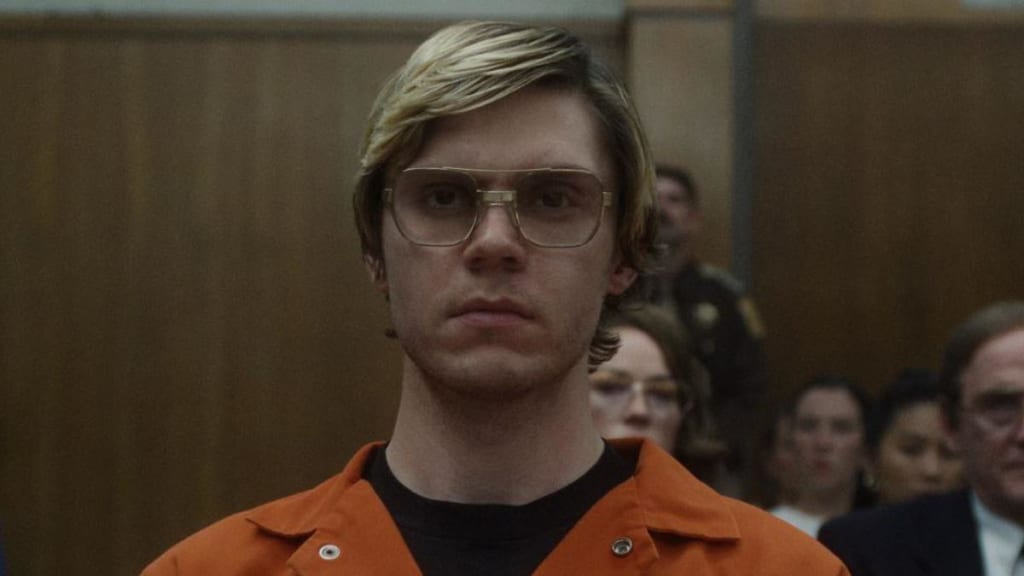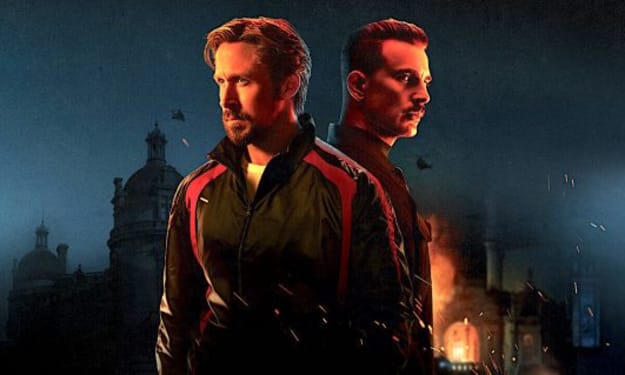JEFFREY DAHMER MOVIE REVIEW
DAHMER-Monster: The Jeffrey Dahmer Story

Dahmer— Monster: The Jeffrey Dahmer Story is as clumsy as its title — why are there two Dahmers in it? Unless it is to signify there are two people — one is the polite, well-spoken young man who lives with his grandmother, and the other being the one who preys on young men, drugging, killing, dismembering, and eating them, without the accompaniment of fava beans and a nice chianti. Incidentally, The Silence of the Lambs featuring Sir Anthony Hopkins as Hannibal the Cannibal was released in 1991, the year Dahmer was arrested.
Ryan Murphy’s limited edition series which like Hollywood, he co-created with Ian Brennan, is not particularly limited. Over 10 hours, it purports to tell the Dahmer story, from the victims’ POV, but it seems like another attempt to dwell on all Dahmer’s ghastly perversions.

Starting at the end, Dahmer begins in 1991, with Tracy Edwards (Shaun J. Brown) running down a street. He flags a police car and tells of a man who was going to kill him. The police come to Dahmer’s (Evan Peters) apartment to find the little shop of horrors and more.
The show moves back and forth from there, going back to Dahmer’s childhood and his abandonment issues with his mother Joyce (Penelope Ann Miller), her depression and pill taking and his father Lionel’s (Richard Jenkins) long absences from home.

Dahmer’s heavy drinking sees him flunk out of college and get discharged from the Army. Lionel, a research chemist, seeing Jeffrey’s interest on the effect of bleach on tissue and bone as a scientific curiosity, taught him how to preserve bones. Jeffrey and Lionel’s trips to collect and dissect roadkill (ewww... no TV dinners with this one) are intercut with the use he put his training to — first in his grandmother’s fruit cellar and later in his apartment.
Incidentally, the fruit cellar references that other serial killer who wouldn’t even harm a fly, Norman Bates. There is mention also of Ed Gein, the inspiration behind Robert Bloch’s 1959 novel, Psycho, which Alfred Hitchcock made into that fine little black and white film in 1960.
The strongest episode in this rather uninvolving series is the sixth, ‘Silenced’, which is told from Tony Hughes’s (Rodney Burford) perspective. Though as his friends say, as a deaf, gay, Black man, Tony has three strikes against him, he does not let the world get him down. He is optimistic, looking for love rather than a hookup, and aspiring to be a model. The sound fading in and out helps us see and hear the world from Tony’s lens.
The series follows the aftermath of Dahmer’s arrest, the trial, Rita Isbell’s (one of the victim’s family played DaShawn Barnes) outburst, the publicity hounds, Dahmer’s incarceration, the fan mail and his death in prison. The effect on the victim’s families is dwelt upon superficially as is the racism that let Dahmer prey on people of colour.\

When one of the victims who got away, Ron, (Dyllón Burnside) asks the police, “you are going to take the word of a white man with a criminal record over that of a black guy with no criminal record?” it is left hanging in the air.
Even more tragic is the fate of the Laotian family, whose 13-year-old son was attacked by Dahmer in September 1988. Later, in May 1991, he attacks the younger son, Konerak, (Kieran Tamondong). Horrifically, when Konerak escapes, the police escort him back to Dahmer’s apartment after Dahmer convinces them that they were lovers. Dahmer then kills the 14-year-old. In court when Konerak’s father says “We believed in the American dream but are living in a nightmare,” there is no again no solution, or way forward.
The acting is excellent as is the recreation of an earlier time right down to the advertisements (Head &Shoulders among others) and music, Joel Adams’ Please Don’t Go is used to chilling effect. Molly Ringwald as Jeffrey’s impossibly understanding stepmother Shari, Michael Learned as Catherine, his long-suffering grandmother, and Niecy Nash as Glenda Cleveland, Dahmer’s persistent and plucky neighbour provide excellent character studies.
Peters kills it (pardon the pun) as Dahmer, creating a sympathetic portrait of a mass murderer and necrophiliac. Jenkins as Lionel, Jeffrey’s father, makes us see his struggle to wrap his head around the monster his sweet, timid, curious child has become.
Nietzsche’s famous warning of not gazing into the abyss, for “the abyss gazes also into you,” should be heeded despite Dahmer being presented as a Hamlet (he even has a Yorrick moment with one of his victim’s skulls).
The film "Dahmer—Monster: The Jeffrey Dahmer Story" leaves much to be desired with its clunky title and unclear intent. It presents two versions of the notorious serial killer: one as a polite young man living with his grandmother and the other as a predator who drugs, murders, dismembers, and cannibalizes young men. This film was released in the same year that Jeffrey Dahmer was arrested and the same year as the highly-acclaimed film "The Silence of the Lambs," which features Sir Anthony Hopkins as Hannibal Lecter.
Ryan Murphy's limited series "Dahmer" co-created with Ian Brennan is far from limited, spanning over 10 hours of screen time. The show aims to provide a perspective of the story from the victim's point of view, but it often comes across as an attempt to focus on the disturbing aspects of Jeffrey Dahmer's crimes.
The series starts in 1991 with Tracy Edwards running down a street, flagging down a police car to report a man who was trying to kill him. The police find a horrific scene in Dahmer's apartment. The show then flashes back to Dahmer's childhood, exploring his abandonment issues with his mother, Joyce, and his father, Lionel. Dahmer's heavy drinking leads to his eventual discharge from the army and flunking out of college. However, his father, a research chemist, fosters Jeffrey's curiosity in the effects of bleach on tissue and bone, and the two even go on trips to collect and dissect roadkill.
This show makes references to other infamous serial killers, including Norman Bates and Ed Gein, who served as the inspiration for "Psycho." The sixth episode, "Silenced," stands out as the strongest, as it is told from Tony Hughes' perspective. The episode highlights the experiences of a deaf, gay, Black man who remains optimistic and resilient in the face of adversity.
The show covers the aftermath of Dahmer's arrest, including his trial, the reactions of the victim's families, the racism that allowed Dahmer to target people of color, and his eventual death in prison. The acting is superb, including standout performances by Evan Peters as Dahmer, Richard Jenkins as Lionel, and Penelope Ann Miller as Joyce.
Despite the warning of Friedrich Nietzsche not to gaze into the abyss, as "the abyss gazes also into you," this series provides a hauntingly sympathetic portrayal of the mass murderer and necrophiliac Jeffrey Dahmer. Peters excels in his role, creating a nuanced and captivating depiction of the infamous killer, while Jenkins' portrayal of Lionel captures the struggle to understand the monster his child has become.
About the Creator
Mohan Ramu
"A movie review should not only reflect the reviewer's personal opinion, but should also consider the wider cultural and social implications of the film."
"A story is a way to say something that can't be said any other way."





Comments
There are no comments for this story
Be the first to respond and start the conversation.